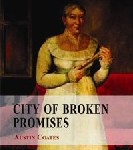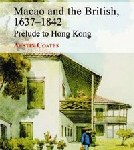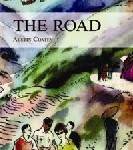Austin Coates Rarities Back in Print
Posted: July 15th, 2009 | No Comments »Well done to Hong Kong University Press (they really are an excellent publisher – and not just of me!) for reviving some of the works of Austin Coates in new editions. For those not familiar with him, Coates (1922–97), was a former senior British civil servant in Hong Kong, Malaya, and Sarawak, who left government service at age forty to pursue a professional writing career. Widely regarded as the most distinguished English-language author in Hong Kong, Coates remained a long-time Hong Kong resident, later dividing his time between Hong Kong and Portugal, where he died.
Now HKUP have republished four Coates classics – three on Macao and one on Hong Kong:
 City of Broken Promises – The city is Macao, the Portuguese settlement on the China Coast, as it was more than 200 years ago. The promises are those made by Englishmen to marry their Macao mistresses, only to leave them abandoned and their children bastards. Martha Merop and her English lover are unique in this period. He, son of the founder of Lloyd’s and cousin of the philosopher, Jeremy Bentham, was one of the first merchants to oppose the trade in opium. She, Chinese, abandoned at birth and sold into prostitution at the age of thirteen, became an international trader in her own right, the richest woman on the China Coast and Macao’s greatest public benefactress. This moving novel that captures the time and place so convincingly is a historical reconstruction of the years 1780 to 1795 when the two were together. It is based on oral tradition handed down through generations in Macao, and on documents that survive about them in Macao, Lisbon and London. Austin Coates identified Martha Merop’s lover, about whom little was known. The documents about him confirmed the traditional Macao story, and the outcome was this book.
City of Broken Promises – The city is Macao, the Portuguese settlement on the China Coast, as it was more than 200 years ago. The promises are those made by Englishmen to marry their Macao mistresses, only to leave them abandoned and their children bastards. Martha Merop and her English lover are unique in this period. He, son of the founder of Lloyd’s and cousin of the philosopher, Jeremy Bentham, was one of the first merchants to oppose the trade in opium. She, Chinese, abandoned at birth and sold into prostitution at the age of thirteen, became an international trader in her own right, the richest woman on the China Coast and Macao’s greatest public benefactress. This moving novel that captures the time and place so convincingly is a historical reconstruction of the years 1780 to 1795 when the two were together. It is based on oral tradition handed down through generations in Macao, and on documents that survive about them in Macao, Lisbon and London. Austin Coates identified Martha Merop’s lover, about whom little was known. The documents about him confirmed the traditional Macao story, and the outcome was this book.
 A Macao Narrative – Macao, 40 miles west of Hong Kong, became a place of Portuguese residence between 1555–57. In this short, lively and affectionate book, Austin Coates explains how and why the Portuguese came to the Far East, and how they peacefully settled in Macao with tacit Chinese goodwill. Macao’s golden age, from 1557 to the disastrous collapse of 1641, is vividly reconstructed. There follows the cuckoo-in-the-nest situation of the late eighteenth century when the British in Macao were a law unto themselves, until the foundation of Hong Kong and the opening of Shanghai gave wider scope for their energies. Portugal’s subsequent struggle to obtain full sovereignty in Macao, and the extraordinary outcome in 1975, brings this account to a close. Special tribute is paid to the risks Macao gallantly undertook in harbouring Hong Kong’s starving and destitute during World War II.
A Macao Narrative – Macao, 40 miles west of Hong Kong, became a place of Portuguese residence between 1555–57. In this short, lively and affectionate book, Austin Coates explains how and why the Portuguese came to the Far East, and how they peacefully settled in Macao with tacit Chinese goodwill. Macao’s golden age, from 1557 to the disastrous collapse of 1641, is vividly reconstructed. There follows the cuckoo-in-the-nest situation of the late eighteenth century when the British in Macao were a law unto themselves, until the foundation of Hong Kong and the opening of Shanghai gave wider scope for their energies. Portugal’s subsequent struggle to obtain full sovereignty in Macao, and the extraordinary outcome in 1975, brings this account to a close. Special tribute is paid to the risks Macao gallantly undertook in harbouring Hong Kong’s starving and destitute during World War II.
 Macao and the British, 1637-1842: Prelude to Hong Kong – The story of the British acquisition of Hong Kong is intricately related to that of the Portuguese enclave of Macao. The British acquired Hong Kong in 1841, following 200 years of European endeavours to induce China to engage in foreign trade. As a residential base of European trade, Portuguese Macao enabled the West to maintain continuous relations with China from 1557 onwards. Opening with a vivid description of the first English voyage to China in 1637. Macao and the British traces the ensuing course of Anglo-Chinese relations, during which time Macao skillfully – and without fortifications – escaped domination by the British and Chinese. The account covers the opening of regular trade by the East India Company in 1770, including the ‘country’ trade between India and China and Britain’s first embassies to Peking, and relates the bedeviling effect of the opium trade. The story culminates in the resulting war from which Britain won, as part of its concessions, the obscure island of Hong Kong. Among those who feature in this lucid and lively account are the merchant princes Jardine and Matheson, the missionary Robert Morrison, the artist George Chinnery, and Captain Charles Elliot, Hong Kong’s maligned founder.
Macao and the British, 1637-1842: Prelude to Hong Kong – The story of the British acquisition of Hong Kong is intricately related to that of the Portuguese enclave of Macao. The British acquired Hong Kong in 1841, following 200 years of European endeavours to induce China to engage in foreign trade. As a residential base of European trade, Portuguese Macao enabled the West to maintain continuous relations with China from 1557 onwards. Opening with a vivid description of the first English voyage to China in 1637. Macao and the British traces the ensuing course of Anglo-Chinese relations, during which time Macao skillfully – and without fortifications – escaped domination by the British and Chinese. The account covers the opening of regular trade by the East India Company in 1770, including the ‘country’ trade between India and China and Britain’s first embassies to Peking, and relates the bedeviling effect of the opium trade. The story culminates in the resulting war from which Britain won, as part of its concessions, the obscure island of Hong Kong. Among those who feature in this lucid and lively account are the merchant princes Jardine and Matheson, the missionary Robert Morrison, the artist George Chinnery, and Captain Charles Elliot, Hong Kong’s maligned founder.
 The Road – Set in 1950s Hong Kong, The Road paints an evocative picture of comfortable colonial life, while at the same time presenting the local people with the shrewd understanding that the author had acquired as a District Officer in rural Hong Kong. Perhaps the central character is the road itself, now easily recognized as the very real Lantau coast road. But in this novel, the road was an idea tossed off by the Acting Governor between cocktails in the course of a launch picnic. To Richard, the District Officer, the road was a challenge, something of his own to be achieved; an achievement, furthermore, that would spell progress for the Chinese villagers. To Richard’s wife Sylvia, an intelligent woman notorious for an ancient affair which she had publicized in a best-selling novel, the road was a new threat to a marriage already riven with complexities. To the island’s villagers, who did not want the road or the changes it would bring, it was the end of a way of life and further evidence that the foreign devils were quite mad. And to the villagers’ more worldly kin, the road was a god-sent invitation to graft.
The Road – Set in 1950s Hong Kong, The Road paints an evocative picture of comfortable colonial life, while at the same time presenting the local people with the shrewd understanding that the author had acquired as a District Officer in rural Hong Kong. Perhaps the central character is the road itself, now easily recognized as the very real Lantau coast road. But in this novel, the road was an idea tossed off by the Acting Governor between cocktails in the course of a launch picnic. To Richard, the District Officer, the road was a challenge, something of his own to be achieved; an achievement, furthermore, that would spell progress for the Chinese villagers. To Richard’s wife Sylvia, an intelligent woman notorious for an ancient affair which she had publicized in a best-selling novel, the road was a new threat to a marriage already riven with complexities. To the island’s villagers, who did not want the road or the changes it would bring, it was the end of a way of life and further evidence that the foreign devils were quite mad. And to the villagers’ more worldly kin, the road was a god-sent invitation to graft.
Leave a Reply